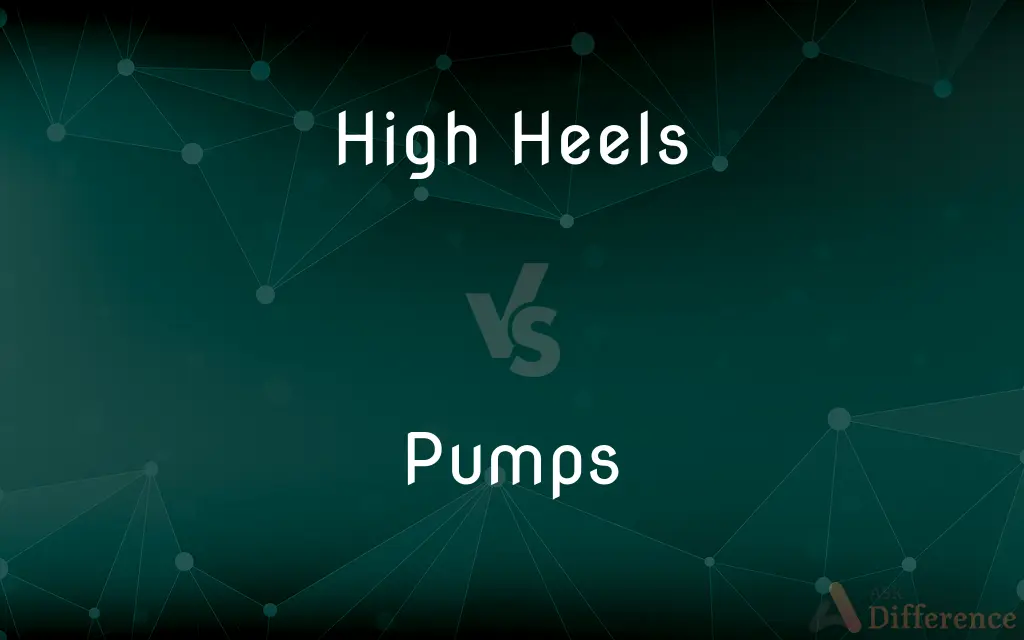High Heels vs. Pumps — What's the Difference?
Edited by Tayyaba Rehman — By Fiza Rafique — Published on December 2, 2023
High Heels are shoes that raise the heel above the toes, while Pumps are closed-toe shoes often with a raised heel.

Difference Between High Heels and Pumps
Table of Contents
ADVERTISEMENT
Key Differences
High Heels are a broad category of footwear characterized by elevating the heel significantly higher than the toes. They come in various styles and designs, from stilettos to platforms. On the other hand, Pumps are a subset within the high heel category, specifically closed-toe shoes, often with a medium or high heel.
While High Heels can include sandals, boots, and other varieties, Pumps are typically more uniform in design, being a classic choice for formal and business occasions.
When someone mentions High Heels, they could be referring to any shoe with a raised heel, regardless of design or function. However, when someone references Pumps, it is understood they're speaking of the specific shoe style with a closed toe and often a raised heel.
Comparison Chart
Type
Broad category
Subset of High Heels
Toe Design
Can be open or closed
Always closed
ADVERTISEMENT
Variety in Styles
Sandals, boots, stilettos, etc.
Limited, mostly formal or business-like
Heel Height
Varies: low to extremely high
Typically medium to high
Typical Occasion
Varies based on design
More formal, office, business events
Compare with Definitions
High Heels
Footwear designed to elongate the wearer's legs.
The High Heels made her feel confident and tall.
Pumps
A type of High Heels often chosen for business or formal attire.
Her office wardrobe consisted of several Pumps in different colors.
High Heels
A fashion statement symbolizing femininity and elegance.
High Heels have been iconic in fashion runways for decades.
Pumps
Iconic footwear symbolizing a blend of professionalism and style.
In interviews, wearing Pumps portrays a polished look.
High Heels
Elevated shoes lifting the heel above the toes.
She wore her favorite High Heels to the party.
Pumps
Closed-toe shoes with a raised heel.
She paired her dress with classic black Pumps.
High Heels
Shoes that tilt the foot forward.
Dancing in High Heels requires practice and balance.
Pumps
Shoes without straps or closures around the ankle.
She loved Pumps for their slip-on convenience.
High Heels
Often chosen for special occasions or formal events.
Weddings often see attendees in beautiful High Heels.
Pumps
A machine or device for raising, compressing, or transferring fluids.
High Heels
Infl of high-heel
Pumps
(Physiology)A molecular mechanism for the active transport of ions or molecules across a cell membrane.
Pumps
(Physics)Electromagnetic radiation used to raise atoms or molecules to a higher energy level.
Pumps
(Informal)The heart.
Pumps
(Informal)The place where consumers purchase gasoline. Used with the:gas prices rising at the pump.
Pumps
A shoe that has a closed back and is cut low around the toes, usually with heels and no fastenings.
Pumps
To cause to flow by means of a pump or pumplike organ or device:Derricks pumped oil out of the ground. The heart pumps blood throughout the body.
Pumps
To draw, deliver, or pour forth:a writer who pumped out a new novel every year.
Pumps
To propel, eject, or insert:pumped new life into the economy.
Pumps
To cause to move with an up-and-down or back-and-forth motion:a bicyclist pumping the pedals; a piston pumping a shaft.
Pumps
To push or pull (a brake or lever, for instance) rapidly:a driver pumping the brakes.
Pumps
To shoot (bullets, for example) at or into:a gunner pumping rounds at a target.
Pumps
(Physics)To raise (atoms or molecules) to a higher energy level by exposing them to electromagnetic radiation at a resonant frequency.
Pumps
(Physiology)To transport (ions or molecules) against a concentration gradient by the expenditure of chemically stored energy.
Pumps
To invest (money) repeatedly or persistently in something.
Pumps
To question closely or persistently:pump a witness for secret information.
Pumps
(Informal)To promote or publicize vigorously:The company pumped its new product on its website.
Pumps
To operate a pump.
Pumps
To move gas or liquid with a pump or a pumplike organ or device.
Pumps
To move up and down or back and forth in a vigorous manner:My legs were pumping as I ran up the stairs.
Pumps
To flow in spurts:Blood was pumping from the wound.
Pumps
(Sports)To fake a throw, pass, or shot by moving the arm or arms without releasing the ball.
Pumps
Plural of pump
Pumps
A low-cut shoe without fastenings
Pumps
Often associated with timeless and classic fashion.
Fashion trends change, but Pumps remain a staple.
Common Curiosities
What are Pumps?
Pumps are closed-toe shoes, often with a raised heel, and are a specific type of High Heels.
What are High Heels?
High Heels are shoes that raise the heel above the toes, coming in various styles and designs.
Why do people wear High Heels?
For fashion, to elongate the appearance of legs, and for formal or cultural reasons.
Can men wear High Heels?
Absolutely, High Heels have been worn by men historically and in modern fashion too.
Why are Pumps popular in business settings?
Pumps blend professionalism with style, making them a popular choice for business attire.
Are High Heels harmful to feet?
Prolonged wear can lead to foot problems, so it's essential to choose wisely and give feet a break.
Are Pumps always High Heels?
Mostly, Pumps have a raised heel, but there are flat versions as well.
Are Pumps suitable for office wear?
Yes, Pumps are often considered appropriate for business and formal occasions.
Can sandals be considered High Heels?
Yes, if they raise the heel above the toes, they can be considered High Heeled sandals.
Are Pumps more formal than other High Heels?
Generally, Pumps are seen as formal, but the formality of High Heels varies based on style.
How do High Heels impact posture?
High Heels can tilt the pelvis forward, potentially impacting posture and causing strain.
Are all High Heels called Pumps?
No, Pumps are a specific style of High Heels, characterized by a closed toe.
Is it harder to walk in High Heels or Pumps?
Both can be challenging, but it depends on the heel height and individual comfort.
Can Pumps have straps?
Traditional Pumps lack straps, but modern variations might include them.
How are wedge heels different from traditional High Heels and Pumps?
Wedge heels run under the shoe, from the back of the shoe to the middle or front, unlike traditional High Heels or Pumps that have a distinct heel.
Share Your Discovery

Previous Comparison
Starch Cellulose vs. Glycogen
Next Comparison
Capital Expenditure vs. Revenue ExpenditureAuthor Spotlight
Written by
Fiza RafiqueFiza Rafique is a skilled content writer at AskDifference.com, where she meticulously refines and enhances written pieces. Drawing from her vast editorial expertise, Fiza ensures clarity, accuracy, and precision in every article. Passionate about language, she continually seeks to elevate the quality of content for readers worldwide.
Edited by
Tayyaba RehmanTayyaba Rehman is a distinguished writer, currently serving as a primary contributor to askdifference.com. As a researcher in semantics and etymology, Tayyaba's passion for the complexity of languages and their distinctions has found a perfect home on the platform. Tayyaba delves into the intricacies of language, distinguishing between commonly confused words and phrases, thereby providing clarity for readers worldwide.













































